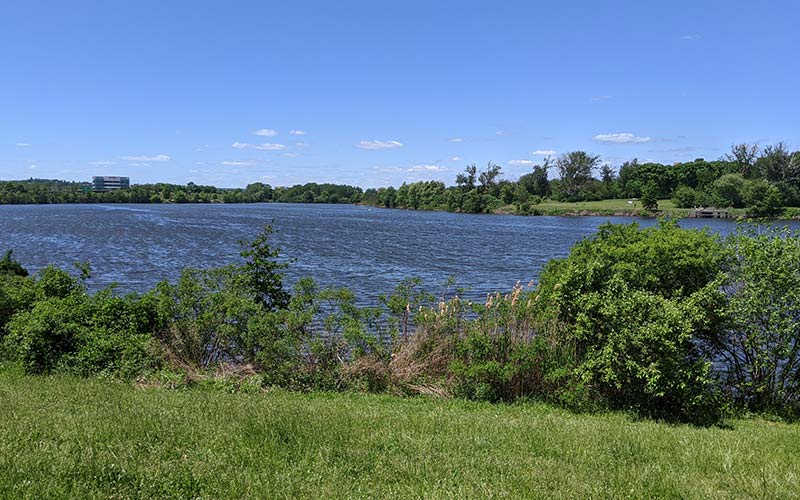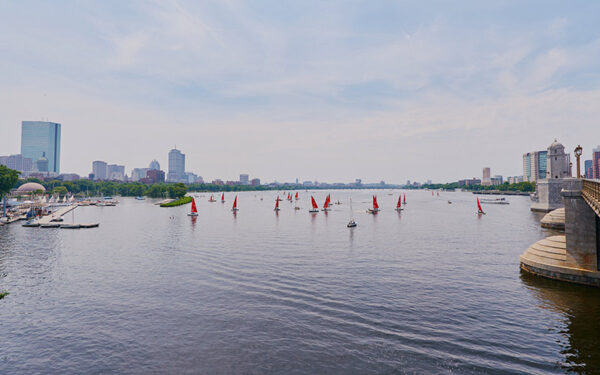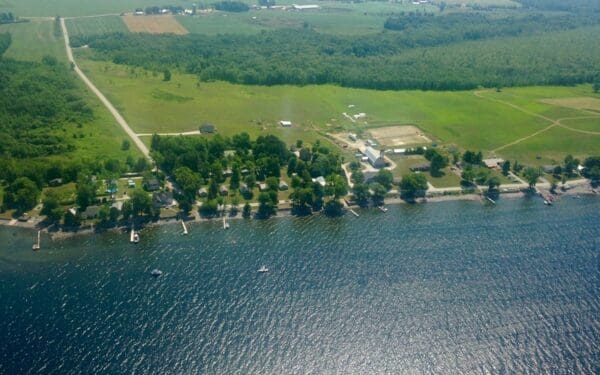
Over the past months, I've been walking and relaxing along the Mystic River. Unfortunately, the Mystic and other waters are threatened by the Trump administration's rollback of Clean Water Act protections.
These days, I’ve found myself drawn more than ever to walking and relaxing by the water. I’m lucky enough to live between two beautiful rivers near Boston: the Charles and the Mystic. When the daily news cycle becomes overwhelming, the steady flow of the water and the peace of nature provide a much-needed balm. On my walks along the Mystic, I’ve watched adorable still-fluffy geese chicks grow into full-size birds, joining swimming ducks and cormorants.
But now, our waters are under threat. This spring, the Trump administration reversed stronger protections for our nation’s waters, putting people, animals, and local businesses at risk.
CLF and our partners are fighting this latest attack: We’re taking the administration to court.
The “Dirty Water Rule” Puts New England Waters at Risk
In April, the Trump EPA rolled back protections under the Clean Water Act for wetlands and streams. This new rule dubbed the “Dirty Water Rule” by environmental groups, narrowly redefines the crucial term “Waters of the United States” (WOTUS).
The Clean Water Act’s protections against pollution and development only apply to waters that qualify as Waters of the United States. Under the Obama administration, the list of qualified waters expanded. The new definition included more protections for wetlands, as well as streams and vernal pools that grow and shrink depending on rainfall. EPA has now reversed course by repealing the Obama WOTUS definition and writing a new one that excludes these waters and puts them under threat.
Even though some of them fill only seasonally, the water bodies now excluded from the Clean Water Act play a critical part in how the natural world fits together. For many frogs and salamanders, for example, these small bustling seasonal pools are essential for reproduction.
The Dirty Water Rule also threatens the health of the larger watersheds these water bodies belong to. After all, even temporary streams ultimately flow to larger rivers – and so does their pollution. Wetlands play a crucial sponge-like role, soaking up excess water during rainstorms and replenishing the water table during droughts. When wetlands are developed or polluted, the entire watershed feels the blow.
Our iconic New England rivers – including the Connecticut, the Merrimack, and the Nashua (as well as my backyard rivers, the Mystic and the Charles) – are already threatened by the pollution that accompanies heavy rain. Stormwater pollution fills our rivers with a soup of industrial chemicals, while gross sewer overflows dump untreated human waste directly into our favorite swimming spots.
And, if our natural wetland buffers lose their federal protections and are then developed, this pollution will only get worse. That means more sewage in our rivers, more toxic blue-green algae from nutrient pollution, and fewer safe swimming days.
The Dirty Water Rule Violates Federal Law
The Dirty Water Rule is not just outrageous and dangerous; it’s also illegal. In the Clean Water Act, Congress gave EPA a sacred mandate to protect the Waters of the U.S. – not to strip them of protection. Courts across the country have already affirmed that the Waters of the U.S. include some of the very same temporary streams, wetlands, and vernal pools now threatened by the Dirty Water Rule.
The agency also failed to do its homework. EPA did not consider or properly analyze how the Dirty Water Rule will affect water quality. It also ignored its own earlier findings that many of the waters excluded under the Rule significantly impact water quality downstream.
Federal law limits EPA’s power to enact new regulations – and it is forbidden from enacting new rules like this that are “arbitrary and capricious.” By not protecting these waters, EPA is violating the Clean Water Act and operating outside its authority.
CLF is Challenging the Dirty Water Rule
CLF has joined forces with the Natural Resources Defense Council, Connecticut River Conservancy, Mass Audubon, and Merrimack River Watershed Council. Together, we are taking on the Trump administration and challenging the Dirty Water Rule in federal court. CLF recently filed a lawsuit demanding that the Dirty Water Rule be struck down, and the case is moving forward.
The Clean Water Act is a powerful tool for keeping our waters safe and our communities healthy. With the climate crisis already impacting New England waters, it’s more important than ever for us to protect them. When healthy, these waters and wetlands provide critical environmental and economic benefits, from flood resiliency to water quality protection to erosion control. And that doesn’t include benefits like kayaking, fishing, or the simple pleasure of taking a walk along a beautiful river.
We won’t let Trump’s dangerous rollback stand. We’re fighting to protect New England’s waters and the Clean Water Act itself from this reckless administration.
Sign up for CLF emails to get the latest news on our clean water work.



